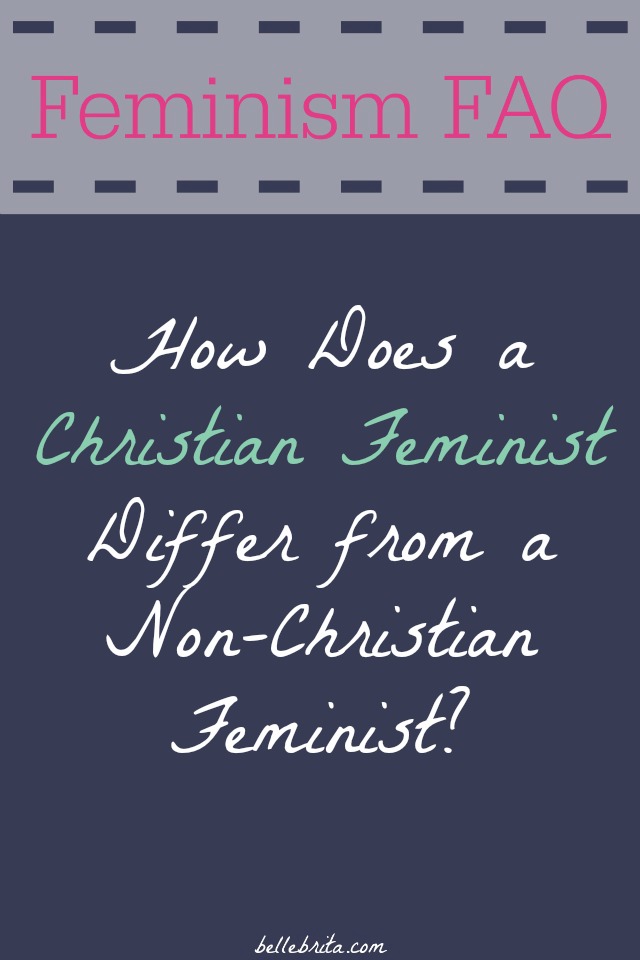Post contains Amazon affiliate links.
I know it’s been ages since I last answered a question about feminism, but Feminism FAQ has returned!!! Mainly because I’m writing this late at night, and I’m exhausted. So for Friday’s The F-Word, I’m answering a question about Christian feminism.
Remember last year, when I had that readers’ survey? One reader responded with the following question about feminism.
What is a Christian feminist, and how is it different from a non-Christian feminist? I read other non-Christian feminist blogs and there doesn’t seem to be one bit of difference between you and them.

That is a great question!
First of all, quite basically, a Christian feminist believes in Jesus and in gender equality. I could go into great detail about what it means to be a Christian or a feminist, but that’s the basic answer.
A non-Christian feminist, however, could be a lot of things. A non-Christian feminist could be an atheist, or could subscribe to another faith tradition. Jewish feminists, Muslim feminists, Hindu feminists, etc. all exist too.
Most feminists share a few basic beliefs. Like we all believe in gender equality. However, what differentiates Christian feminists from other feminists is that we work within a patriarchal religion to promote gender equality.
Check out a list of my favorite Christian feminist bloggers
For example, if you’re not a Christian, you probably don’t focus much energy on the ordination of women in Christian denominations. However, as a Christian feminist, women’s ordination matters greatly to me.
Purity Culture (and the subset Modesty Culture) are not unique to Christianity, but Christian feminists also work to combat the Christian versions. We oppose slut-shaming. We support women’s sexual choices and their clothing choices. Other feminists do this too, but Christian feminists use scripture to support our arguments.
Christian feminists like me aren’t just working within religious circles, however. That’s probably why my blog doesn’t seem all that different! My Feminism 101 posts address basic issues within feminism, that apply to all feminists.
Basically, Christian feminists and non-Christian feminists aren’t that different! Really, the major difference is that Christian feminists consider the entire Bible valid, and we work to change misogynistic attitudes from other Christians. Non-Christian feminists don’t believe in the Bible, and thus probably don’t care as much about sexist interpretations of biblical passages. (Edit: my Jewish aunt pointed out that Jewish feminists care about sexist interpretations of the Torah).
Have a question about feminism? Feel free to leave me a comment! Do you agree or disagree with my answer to this question?

I do care that most Christian denominations don’t ordain women, even though I’m an atheist. Christianity is huge. We’re all affected by it, whether we believe in it ourselves or not.
I’m glad to hear that you care about the ordination of women. However, in my experience, as a frequent reader of many feminist writers, only the Christian feminists bother to write about the ordination of women, and other issues unique within religion. If non-religious feminists write about things like Purity Culture, it’s usually not with any suggestions or perspective on how to change the problems from within any religion, but rather to analyze how it spills over into secular culture.
And to be honest, I’ve regularly encountered feminists quite hostile to the idea of being a Christian feminist at all, who have told me I can’t be both a Christian and a feminist, that it’s not possible to believe in the Bible and in gender equality, that I’m supporting the oppression of women by attending church. Luckily those feminists have been in the minority over the years, but it’s still quite disconcerting. (Of course, I get the same judgement from Christians who call me a heretic, a supposed Christian, and sinful for leading others astray).
I did edit my post slightly. That section now reads, “For example, if you’re not a Christian, you probably don’t focus much energy to the ordination of women.”
I think dsws was referring to this sentence: “Non-Christian feminists don’t believe in the Bible, and thus probably don’t care as much about sexist interpretations of biblical passages.” I agree that the statement is a little too big to make, and reacted the same way. I’m not Christian, but my family is and it really affects my life — even if they weren’t. Your comment below explains it better, though 🙂
I’ve been thinking about how to respond to this comment, and if that sentence should be edited too. But I’ve reread my post several times, I’ve thought about my experiences as a Christian feminist, and I’ve considered your point.
A non-Christian feminist, especially a secular feminist, simply cannot care as much as a Christian feminist does about the Bible. It’s not possible because you cannot have the same deeply personal connection to the Bible if you do not believe it is the Word of God.
It’s like how few of my friends and family truly understand the depth of my feelings for France. The one person who really expressed how I felt the last time I left was my second cousin, who grew up in France and repatriated to the US. She understands how I feel because she’s had similar experiences.
In my experience, most non-Christian feminists, if they bother to talk or write about Christianity at all, focus on discrimination, or abortion laws, or abstinence-only education, basically issues in which religion affects the decisions of lawmakers. While these are all important topics, and absolutely reasons to criticize the widespread effects of Christianity, the non-Christian answer is almost always a focus on separation of church and state, a freedom FROM religion just as much of religion. It’s completely different than accepting scripture as valid, but then researching translation issues, historical context, historiography, etc. in order to decide how to interpret the scripture today.
I hope that clarifies my perspective. <3
I totally understand what you’re saying! It makes sense that I wouldn’t be quite as passionate about the issue. I don’t even understand the Bible the same way that you do. But it’s hard not to react the way dsws and I did, because of the way the sentence is worded – because I totally do care about the sexism in the Bible! So much that it’s the reason I couldn’t be a part of my parents’ church anymore – they just accepted that women have next to no rights and that their voices don’t matter. They didn’t choose to fight it or do anything about it, and we had plenty of arguments. It’s a real struggle to get along when I go home.
But aside from my own personal experience, I think people who are not Christian can definitely care about the sexism in the Bible as much as Christians. They just care about it in a different way, like the ways you’ve mentioned. They could even care about it so much that it’s why they’re not Christian. As a non-Christian feminist, I wouldn’t write or focus on Christian feminism only because I don’t think it’s my place to, and I don’t want to speak for Christian feminists. But that doesn’t mean I care *less* about the problems with sexist interpretations of the Bible.
I think it’s also the connotation of the words “don’t care” and unfortunately “as much” just felt like an afterthought in that sentence, even though it’s not. I know that’s nitpicky… but I hope this clarifies my perspective as well! (I’m really afraid of doing something similar to what White Feminists do when it comes to intersectionality… I hope I’m not coming off that way!)
This has been informative and enlightening. It’s important to understand these things because it affects everyone in the society.